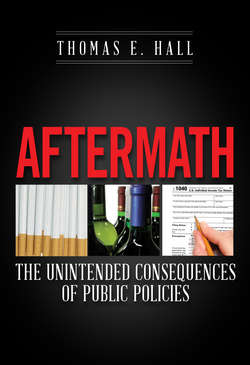Читать книгу Aftermath - Thomas E. Hall - Страница 7
На сайте Литреса книга снята с продажи.
ОглавлениеPreface
This book describes four case studies of the law of unintended consequences as it applies to government policy. The well-known result that government policies designed to bring about one set of goals often create unanticipated outcomes has taken on increasing importance as governments become ever more involved in social and economic affairs.
I became interested in this topic while researching 20th-century U.S. macroeconomic policies. My studies of business cycles, the Great Depression (with J. D. Ferguson), and the perverse economic policies carried out during the presidencies of Richard Nixon and Jimmy Carter convinced me that most of the macroeconomic instability experienced by the United States had resulted from poorly designed government policies. I then began to consider the effects of policies targeted toward more specific issues (as opposed to the overall macroeconomy). Abundant examples of the law of unintended consequences exist; the hard part was choosing a small group to focus on.
The four cases described in this book are, I believe, interesting and important and will prove enduring. The federal income tax has existed since 1913, and given the desire of the middle and lower classes that the rich pay their “fair share,” the income tax will almost certainly continue to play a major role for years to come. Cigarette taxes have been around since the 1860s and will likely be with us for as long as people smoke cigarettes. State minimum wage laws first appeared in the early 1900s, and the original federal law was put in place in 1933 as part of the New Deal. Given the ongoing demands that workers should earn a “living wage,” we can expect minimum wage supporters to advocate not only for keeping the law but for continuing increases in the minimum wage. The final case is alcohol Prohibition. Although it ended in 1933 because the unintended consequences were so devastating, it has major applications to the war on drugs, which has been an explicit policy of the U.S. federal government since the early 1970s.
Several individuals assisted on this project. J. David Ferguson, D. Christopher Ferguson, William Hart, and Kenneth Ashley read drafts of chapters and offered valuable comments. I also benefited greatly from discussions with Charles Moul, James Brock, and Michael Winrow on a variety of topics. Graduate students Matt Mauck, Neel Shivdasani, and Heather McHone proofread and checked references. And my wife Christine read chapters and made comments, along with providing a loving and supportive environment. Any errors are my responsibility. Financial support for this project was provided by Miami University.
This book is dedicated to the memory of my late brother, James Ashley Hall.
